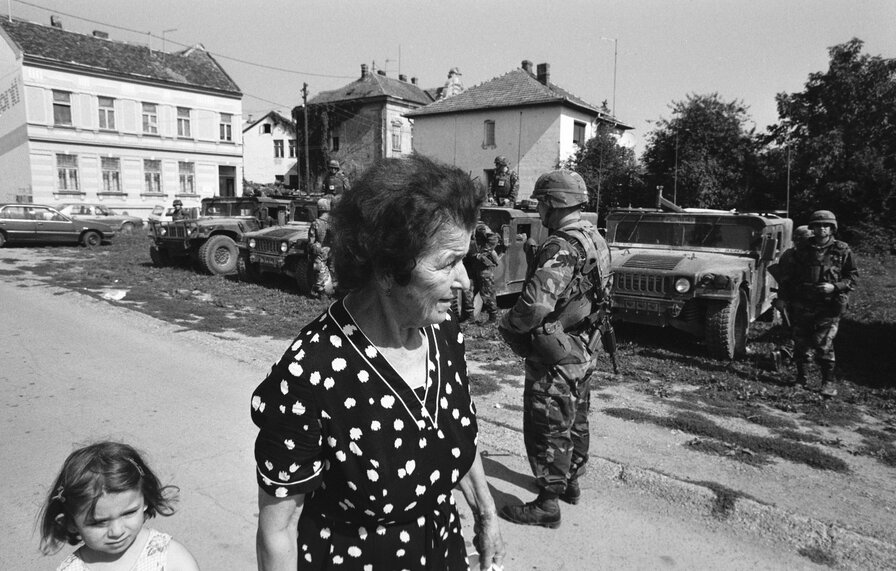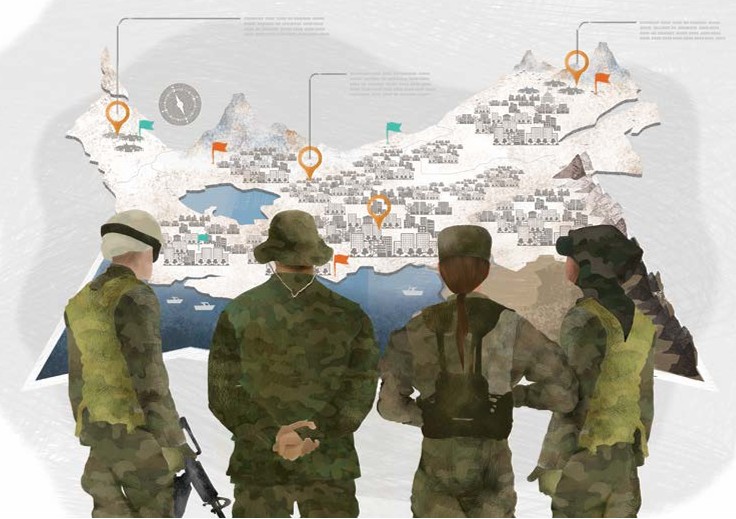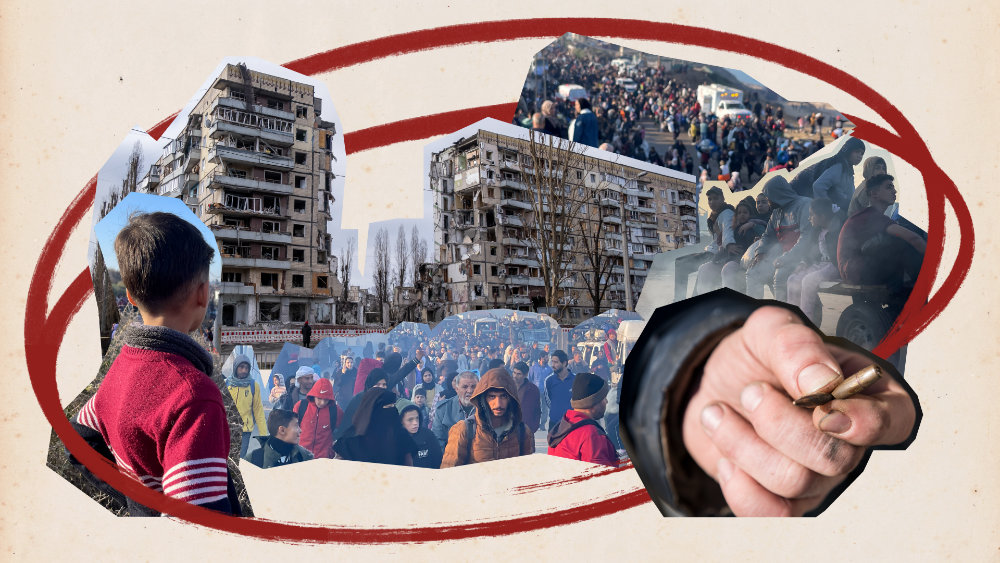As the armed conflict in Ukraine persists, rapidly unfolding events have entailed grave implications for civilians trapped in the crisis, such as death, injury and displacement from their homes and normal lives, to name but a few. In some areas in Ukraine, those who have remained in their homes have woken up to find that the areas in which they live are no longer under the control of the Ukrainian government but under the control of Russian forces.
In this post, ICRC Legal Adviser Mikhail Orkin and ICRC Senior Legal Adviser Tristan Ferraro take a closer look at how IHL regulates a situation of occupation and provides protections for the civilian inhabitants of an occupied territory.
The numerous rules of international humanitarian law (IHL) which seek to protect civilians, most prominently included in the Fourth Geneva Convention of 1949, give expression to the fundamental respect for the human person and for the inviolable character of the basic rights of the individual. IHL contains rules specifically developed to apply in occupied territory. One of the main goals of these rules is to redress the unique vulnerabilities of a civilian in occupied territory.
For the purposes of IHL, occupation is a type of international armed conflict. The laws of occupation are contained primarily in the Hague Regulations of 1907, the Fourth Geneva Convention of 1949 and its Additional Protocol I and also in customary IHL.
Occupation, a matter of effective control over territory
The rules of IHL specifically applicable to occupied territory come into force once the territory is deemed occupied. The existence of an occupation must be determined solely on the basis of the prevailing facts. A determination based on the prevailing facts conforms with the strict separation of jus in bello and jus ad bellum.
The constitutive elements of occupation are exclusively derived from Article 42 of the Hague Regulations of 1907. Despite the vagueness of this provision’s plain language, IHL treaties and their preparatory work, scholarly literature, military manuals, and judicial decisions all give proof of the pre-eminence accorded to three elements in the occupation equation, namely: the unconsented-to presence of foreign forces, the foreign forces’ ability to exercise authority over the territory concerned in lieu of the local sovereign and the related inability of the latter to exert its authority over the territory. All together, these elements constitute the so-called ‘effective-control test’ used to determine whether a situation qualifies as an occupation for the purposes of IHL. The notion of effective control of foreign territory is at the heart of the notion of occupation, and it is effective control which will permit the foreign troops to enforce duties imposed on them by occupation law.
General principles
Though the laws of occupation are contained in various IHL instruments and sources, occupation law rules generally share the same reasoning, which is based upon four basic and general principles.[1]
First, the occupation law rules reflect the principle that an Occupying Power does not acquire sovereign rights to the occupied territory. It therefore may not effect changes in the status and intrinsic characteristics of the occupied territory.
Second, occupation law rules reflect the principle that occupation is a temporary situation. In this regard, the Occupying Power must maintain the status quo ante and must not adopt policies or measures that would introduce or result in permanent changes, in particular in the social, economic and demographic sphere. As a result, the rights and duties set forth in occupation law of the Occupying Power are also temporary – they are limited to the duration of the occupation. These rules essentially require the Occupying Power, during the temporary period of the occupation, to maintain as normal a life as possible in the occupied territory and to administrate the territory for the benefit of the local population, while taking into account its own security needs.
Third, the rules of occupation law that govern the exercise of powers by the Occupying Power, always require it to take into account, and balance, two interests: its own military needs and, simultaneously, the needs of the local population. This balance should be reflected by the Occupying Power in the way it administers an occupied territory and more generally in all the actions it takes and the policies it implements in that territory. Importantly, while this balance may sometimes be decided in favour of the security needs of the Occupying Power, the rules of the law of occupation never allow the Occupying Power to completely discount the needs of the local population in the actions it takes.
Fourth, it can generally be said of the rules of the law of occupation that they do not allow the Occupying Power to exercise its authority in order to further its own interests (other than its military interests), or with a view to using the inhabitants, the resources, or other assets of the territory it occupies for the benefit of its own territory or population.
These four general principles should be considered in relation to all matters which are occupation law related, and they underpin the main provisions of this body of law.
The foundational obligation of the Occupying Power
The Occupying Power has a duty to restore and maintain public order and civil life in the territory that it occupies. The Occupying Power might not be able to achieve this restoration and maintenance, but it must make every effort to do so. For this reason, this foundational obligation has been described as an obligation of means and not result. Under this obligation, the Occupying Power must assume the administration of the occupied territory, which includes the responsibility for the welfare of the occupied territory’s population.
The Occupying Power must also not interfere with public order and civil life in the occupied territory, or its laws and institutions, unless absolutely necessary for lawful purposes. For example, the Occupying Power is granted a limited permission to repeal, suspend or enact legislation into the law of the occupied territory where essential to enable it to (i) fulfil its obligations according to IHL; (ii) to maintain the orderly government of the territory or (iii) to ensure its security.
The actions of the Occupying Power in administering the occupied territory, in keeping with this foundational obligation, must comply with the laws of occupation, which contains numerous rules specifically designed to regulate all aspects of this type of administration. Some of these rules grant the Occupying Power authorities in order to facilitate compliance with its foundational obligation and related duties. Yet other rules of the law of occupation set out the limits on these powers and restrict what the Occupying Power may do to realize its duty. Therefore, the law of occupation is both permissive (allowing the Occupying Power to exert certain significant powers) and prohibitive (putting limits on what it can do in occupied territory).
The powers granted to the Occupying Power allowing it to fulfil its foundational obligation also include the authority to take security measures. However, this authority is strictly limited. IHL also limits the severity of security measures that can be taken against protected persons. It provides that the Occupying Power may – at the most – subject protected persons to internment and assigned residence, and only in accordance with the grounds and procedures set forth in the Fourth Geneva Convention.
Selected occupation law rules of central importance
In this post, we are focusing on selected rules of central importance related to ensuring the basic needs of the population, treatment of protected persons and the granting of access to the International Committee of the Red Cross (ICRC). The rules selected provide examples of how the general principles and fundamental obligations of occupation law are framed in great detail seeking to regulate, and ameliorate, the actual situation in the occupied territory. However, it should be kept in mind that occupation law contains numerous detailed and specific rules covering a myriad of other important matters, such as, for example, the protection of public, private and cultural property and ensuring the functioning of medical services and educational establishments, which we won’t have space to examine here.
Ensuring the basic needs of the population
To begin with, the Occupying Power must ensure the basic needs of the population of an occupied territory from the start of the occupation through to its conclusion. This is in keeping with its foundational obligation to restore and maintain public order and civil life. Occupation law contains a host of additional specific rules with regards to basic needs. It is fair to say that the treaty rules of IHL which regulate such basic needs are furthest elaborated with regards to occupied territory.
For example, the Occupying Power must, to the fullest extent of means available to it, ensure the food, and medical supplies of the population. If these resources are inadequate in the occupied territory, it must bring such supplies into the occupied territory. In addition to these duties, the Occupying Power is also obligated, to the fullest extent of the means available to it and without any adverse distinction, to ensure the provision of clothing, bedding, means of shelter, other supplies essential to the survival of the civilian population of the occupied territory and objects necessary for religious worship.
If the whole, or part, of the population of an occupied territory is inadequately supplied, the Occupying Power must agree to relief schemes on behalf of the said population and shall facilitate them by all the means at its disposal. Even though the Occupying Power remains responsible for the basic needs of the population, such relief schemes may be undertaken by the ICRC or other impartial humanitarian organizations. If the Occupying Power cannot fulfil its primary obligation to meet the basic needs of the occupied territory’s population, it must – without exception – grant access, facilitate such relief schemes and must respect and protect personnel involved therein. The Occupying Power is however entitled to a right of control aimed at ensuring that the schemes are exclusively humanitarian in nature. The implementation of this right of control must be made in good faith and must not result in unduly delaying or rendering impossible the delivery of the humanitarian relief in occupied territory. Indeed, in contrast with many other obligations under occupation law, the obligation to allow and facilitate relief schemes when the population of the occupied territory is not adequately supplied is a strict obligation of result.
Treatment of protected persons
The Fourth Geneva Convention includes special protections for protected persons. For the most part, in occupied territory, protected persons include nationals of the occupied Power located in that territory.
The rules concerning protected persons also apply in territories other than occupied territory in international armed conflicts. When applied in occupied territory, these rules provide thorough regulation of how the Occupying Power treats protected persons in the territory. Once the occupation has started, the Occupying Power is responsible for the treatment accorded to protected persons in the occupied territory by anyone officially representing it.
A key obligation incumbent on the Occupying Power requires it to treat protected persons humanely and protect them against all acts of violence or threats thereof and against insults and public curiosity. Protected persons are entitled, in all circumstances and at all times, to respect by the Occupying Power for their persons, their honour, their family rights, their religious convictions and practices, and their manners and customs.
There are also numerous absolute prohibitions in occupation law. According to one of them, torture of protected persons is absolutely prohibited. The Occupying Power must also refrain from subjecting protected persons to coercion, collective punishment and it may not take them hostage.
ICRC access and visits to protected persons
The Occupying Power must afford the ICRC a right of access to all places where protected persons are located, in particular to places of internment and other places of detention, and of work, as well as a right to interview without witnesses. The duration and frequency of such visits may not be restricted, except temporarily for reasons of imperative military necessity. In addition, the Occupying Power, as is the case for any parties to the conflict shall grant access to the ICRC to all facilities within its power so as to enable it to carry out the humanitarian functions assigned to it under IHL to ensure protection and assistance to the victims of the armed conflict.
Immediate versus gradual fulfilment of occupation law obligations
The occupation law framework is extensive, and an Occupying Power would not be expected to fulfil all its duties under occupation law as the occupation starts. Occupation law obligations which are negative obligations (i.e. that require the Occupying Power to refrain from doing something, for example, the prohibition of torture), or those that provide protections for core rights of protected persons, must be fulfilled and complied with immediately. However, some other rules of occupation which require the Occupying Power to take more extensive action in the occupied territory may be fulfilled progressively. It is a matter of capacity: even the more extensive obligations, such as the maintenance of public order and safety, or providing for the basic needs of the population, may require an Occupying Power to take immediate action within the limits of the resources available to it, but the requirements and expectations of what the Occupying Power will be able to do will become more extensive over time. The extent to which the Occupying Power can fulfil its positive obligations under occupation law depends on factors such as the nature and the duration of the occupation, continuation of hostilities, the resources available to the Occupant, the needs of the local population and the security of the Occupying Power.[2]
Having an impact: occupation law as a tool to navigate the complexity of occupation, save lives and lessen suffering on the ground
The law of occupation strives to make an impact outside of the law books and in the real world. This is the reason that its rules are so detailed, factual and intensely practical – they are a rule book which is to be used to better the actual situation of civilians in occupied territory. They also provide a roadmap to navigate the complex interests and dangerous situation which is presented where the local population finds their lives and destiny in the hands of an Occupying Power. For humanitarians, IHL provides a guiding framework for neutral and impartial humanitarian action, and this is also true in a situation of occupation. It is hoped that in these difficult times, this body of law can be implemented effectively with a view to achieving this impact.
[1] The passage in this blog under the heading ‘General principles’ is based upon Spoerri, Philip, ‘The Law of Occupation’ in Andrew Clapham and Paola Gaeta (eds), The Oxford Handbook of International Law in Armed Conflict, Oxford University Press, 2014, pp. 185–186.
[2] Benvenisti, Eyal, ‘The International Law of Occupation’, 2nd edition, Oxford University Press, 2012, p. 76.
See also
- Ramin Mahnad, Shielding prisoners of war from public curiosity, June 28, 2022
- Yvette Issar, On trial: the Third Geneva Convention and judicial guarantees for prisoners of war, June 23, 2022
- Robert Mardini, Back to basics: humanitarian principles in contemporary armed conflict, June 16, 2022
- Cordula Droege, Armed conflict in Ukraine: a recap of basic IHL rules, March 17, 2022







Comments